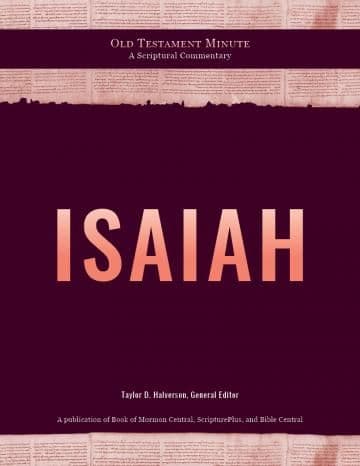Book
34 Chapters

This chapter begins describing the corruption that will exist and explaining that there will be a day of reckoning or judgment. It asks the questions, “What will you do when that day comes?” “To whom will you run for help?” “Where will you leave your riches?”
10:4. This verse can be translated as,
Nothing will remain but to cringe
among the captives
or fall among the slain.
Then we come to the fifth repetition of, “Yet for all this, his anger is not turned away, his hand is stretched out still.” Why does Isaiah scatter this eternal truth throughout his prophecies? Perhaps the idea is to contrast eventual judgment with atoning mercy.
10:5. Verse 5 suggests that Assyria has been a tool of judgment in the Lord’s hand.
10:6. In other words, the Lord sends Assyria against a corrupt nation “to seize, loot, and snatch plunder” (as Mahar-Shalal-Hash-Baz’s name describes).
10:8–10. The leaders in the Assyrian armies commanded more men than the kings of the small city-states they conquered. The cities of the Assyrian’s conquests are listed north to south, ending at the border of Judah.
10:11. The king of Assyria believed that he would be successful against Judah because he had succeeded against all others.
10:12. When the Lord has finished all his work against Mount Zion and Jerusalem, he will say, “I will punish the king of Assyria for the willful pride of his heart and the haughty look in his eyes.”
10:13–14. A description of what the Assyrian king had been boasting of with colorful metaphors.
10:15. God declares that his tool (Assyria) is powerless against the one who wields it.
Prefaced by, “Don’t you understand? Do the axe, saw, rod, and club act independently of those who have created them?”
10:16. See Isaiah 36 and 37 for more information on the wasting disease that falls upon the Assyrian king’s sturdy warriors.
10:17. This verse can also be rendered,
The light of Israel will become a fire,
their Holy One a flame;
in a single day it will burn and consume
his thorns and his briers.
10:17–18. These verses describe the eventual defeat that Assyria will suffer.
10:20. Isaiah prophesies of a day when a remnant of Israel (the survivors of the House of Jacob—notice the parallel expression) will truly rely on the Lord, the Holy One of Israel.
10:21. “The remnant shall return” is the name of Isaiah’s son Shear-jashub and a prophecy of the future gathering of Israel.
10:26. This refers to the deliverance of Israel from Midian under the leadership of Gideon as described in Judges 7:25. Isaiah has consistently likened Assyria to mighty waters but now reminds his listeners that God has power over water, as at the Red Sea.
10:28. Verses 28–32 describe the route taken by the Assyrians as they approached the Mount of Olives, the hill of Jerusalem.
10:33. Although destruction by the Assyrians appears inevitable, they are instead stopped at this location and are hewn down, saving Jerusalem. Interestingly, the fallen trees in this verse and verse 34 are cut down with an axe. Lebanon will fall before the Mighty One. The imagery of a once-mighty forest chopped down to stumps is continued in Isaiah 11:1. Disregard the chapter break.
Book
34 Chapters
Items in the BMC Archive are made publicly available for non-commercial, private use. Inclusion within the BMC Archive does not imply endorsement. Items do not represent the official views of The Church of Jesus Christ of Latter-day Saints or of Book of Mormon Central.